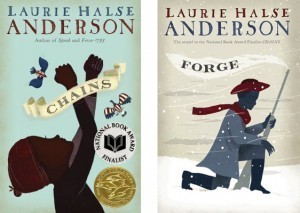Chains and Forge by Laurie Halse Anderson
 Another LHA post, another chance to win a copy of Speak! To enter for a spot in the drawing, just comment below, tweet about this post (and include @EliseLAllen), or refer someone to the page and have them mention you in the comment (and you'll both be entered).
Another LHA post, another chance to win a copy of Speak! To enter for a spot in the drawing, just comment below, tweet about this post (and include @EliseLAllen), or refer someone to the page and have them mention you in the comment (and you'll both be entered).
Last month, I had the pleasure of speaking to a group of fifth graders about books and writing. All the kids were terrific, but there was one I especially enjoyed. Nearly eleven, she already had a daily schedule of journaling and working on her fiction; she had an opinion about everything; and she could hold her own in any adult conversation, and relished the chance to prove it.
We'll call her Brenda.
Brenda was — to no one's surprise — the most well-read kid in the room. She had a long list of favorites, and expounded on what she loved best about each book and author.
It wasn't long before I brought up one of my favorite authors (surprise surprise), Laurie Halse Anderson. I knew the crowd was too young for Speak or Wintergirls, but I imagined Chains and Forge would be appropriate. I raved about the books, but warned that they aren't easy reads.
The novels are the stories of Isabel and Curzon, two young slaves at the time of the Revolutionary War. Chains is narrated by Isabel, a thirteen year old who is sold along with her five year old sister. Their lives are neither sugar-coated nor played for melodrama, which makes the story all the more horrible… and all the more wonderful. The horror is of course the constant slap in the face that while Isabel herself is fictitious, her story is completely real. The wonder comes on two levels, both from Isabel's drive and spirit, and from the clear-eyed, unvarnished view of what America was really like at this time in its history.
I started telling the class about Chains and Forge (which picks up after Chains ends, is narrated by Curzon, and takes us from city life into the realities of being a soldier in the Revolutionary War), and Brenda grew very uncomfortable. She said she couldn't bear to read any historical fiction or non-fiction that was too disturbing. Several months ago she'd read Anne Frank: The Diary of a Young Girl, and it was awful for her. She understood that terrible things happened in the world, but she didn't want to read about them, because that brought it too close to home.
I get it. Books like Chains and Forge are not light. If you have a shred of empathy, you will find moments where you're ripped apart, where you're screaming at the injustice of it all, and at the hypocrisy — Isabel and Curzon are enslaved by the very community that's risking their lives for freedom. The emotional roller coaster is even greater because Laurie's writing is never manipulative. She doesn't editorialize; she simply tells the story, always remaining true to her narrators and to history.
So I sympathized with Brenda. And yet what I told her (and the librarian backed me up — good to have the professional educator behind me) is that it's the discomfort in reading these books and others like them that make them so important. You can't learn from history unless you know it. Textbooks explain the facts, but Chains and Forge bring the past to life viscerally, in a way no reader will ever forget. If you read these books, if you walk in Isabel and Curzon's shoes, you cannot turn a blind eye to those unjustly suffering at the hands of others, whether that suffering is happening centuries in the past, half a world away, or in our own backyards.
Your turn — have you read Chains and Forge? What did you think? What other works of historical fiction have you enjoyed and admired? Remember — everyone who comments will have a chance to win a copy of Speak, so let me know your thoughts!



